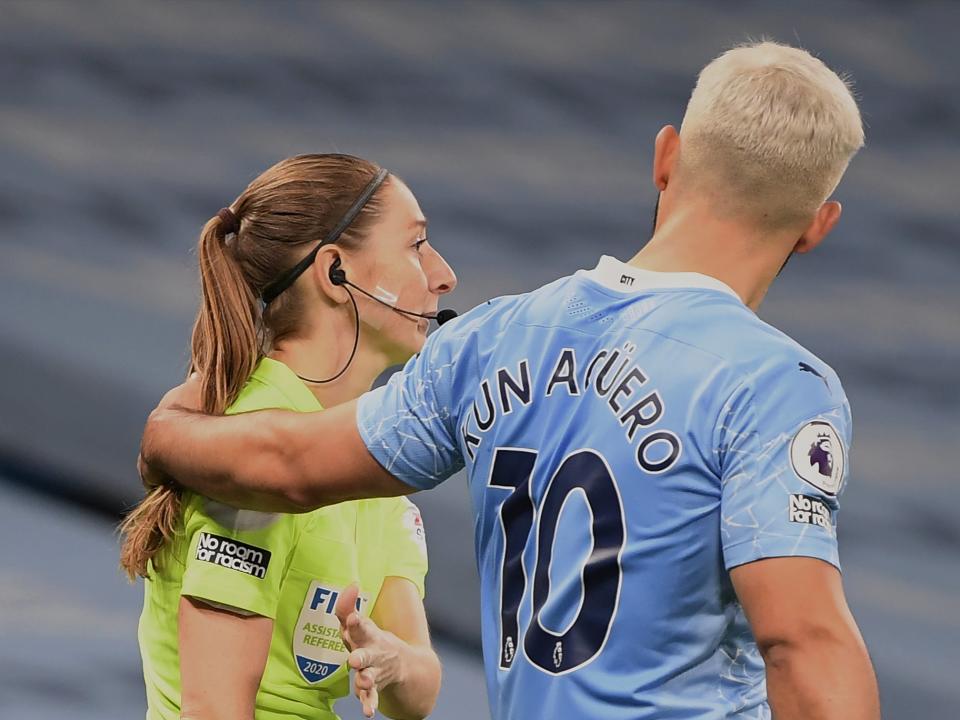Sport must use Sergio Aguero and Sian Massey-Ellis incident for more subtle education

One of the best examples of out-of-sync social media discourse arose last weekend with the incident between Sian Massey-Ellis and Sergio Aguero.
The Manchester City striker, irked by a decision against him, grabbed Massey-Ellis at the base of her neck and collar to reason, frustrated with the decision. The assistant referee flinched, batted him away and continued to run the line.
What followed was a collective deep think of the kind where there are multiple planes and no middle ground. On one side were those condemning the inappropriateness of the contact. On the other, fans arguing contact between players and referees is commonplace. Some were armed with photos as proof.
So began an endless two-way stream of argument and counter-argument that never met. Both holding firm in their stances, digging deeper as interactions became more and more heated. Just Twitter doing Twitter things, as Twitter would say. The irony here being that both sides were correct.
Players are often tactile with referees. Over-familiarity with officials is a familiar tactic for getting marginal calls your way: treating the one who is constantly berated with a bit of sugar can go a long way. Plus, if Massey had any gripes, she could have alerted referee Chris Kavanagh who would have dished out punishment. Indeed, the organising body of match officials, the Professional Game Match Officials Limited (PGMOL), saw no reason reason for retrospective disciplinary action.

But the reaction against Aguero was not about football, nor was it about rallying to defend Massey-Ellis. She has fought her own battles well enough to get to the pinnacle of her profession. It was about what women recognised in that moment.
The unsolicited arm around the shoulder, the squeeze and pull in. That this took place in a professional setting adds another layer to the familiarity.
Change the background to a bar or any other social setting and the image fits. Even if this interaction was done under the guise of playfulness, it was one many found triggering. Both Suzy Wrack in The Guardian and Orla Chennaoui in the Metro have articulated this especially well.
What’s important to recognise is that here is a moment to reflect. One less about respect shown to referees, or about whether equal opportunities, especially as a football referee, should come with the trappings of equal treatment, but primarily about how greater diversity in sport is bringing important social issues to the fore. And that is no bad thing.

Off the back of Saturday and the discussions that followed, there has been plenty of food for thought. Without the likes or Wrack, Chennaoui and many other women working in the media, the conversation might have been dominated by men charging in armed with the very worst of "good intentions".
At the same time, this was not about using sport as a vehicle to shame. But rather allowing it to continue as a vehicle for subtle education.
The change in how we talk about sport is perhaps the best example of this. Coded language around sex, sexuality, race and mental health are being weaned out of its syntax. Similarly, more needs to be done when discussing trans-athletes to prevent the usual spiral into toxic discourse.
Behavioural adaptations are much the same. Last month, Essex batsman Feroze Kushi had a beer poured on him during celebrations at Lord’s after winning the Bob Willis Trophy Final. The club and captain Tom Westley issued a swift apology. An honest mistake from a teammate to a Muslim cricketer – one he and others will learn from.
There will be some who claim this is the slow eroding of the best of British sport and the best of British men. But sport has consistently embraced other cultures and philosophies as part of its natural evolution.
The counter-pressing we see in our top-flight football was brought over from Germany. Sir Ranjitsinhji Vibhaji Jadeja opened up the leg side for English cricket with the leg glance. Japanese pitchers in Major League Baseball brought with them an array of variations.
All of what we see today is the result of these subtle changes. Ones which have adapted as much for demands on our time as broader tweaks that encourage inclusivity. And last Saturday’s incident in the Premier League is another.
Pep Guardiola has played down an incident involving Sergio Aguero after the Manchester City striker disputed a decision with official Sian Massey-Ellis in Saturday's match against Arsenal.
— Sky Sports Premier League (@SkySportsPL) October 19, 2020
It is not as binary as Aguero receiving a yellow, or whether Massey-Ellis sees it as an issue. No one needs to give out a tag of perpetrator, victim or scapegoat.
But there is no harm in heeding what has been said by those who just want to continue to feel at ease day to day in their lives, whether in football or not. And it is important not to conflate Massey-Ellis’s strength and calmness in this situation, one she had no choice in, as the level required by all females who wish to officiate at the very top. As this situation has shown, what is fine for one woman is not necessarily so for another.
But the optics are important. And if the Premier League really is the self-proclaimed best of the best, this is something it must get right, and be seen to want to get right. It’s of acceptable interactions beyond football, bigger than a footballer, an assistant referee and a contested throw-in at the Etihad.
Here is probably the point to say, no, this is not political correctness gone mad, nor wokeness creeping in at the back post. The game has not gone. It is exactly where it always was, slowly correcting itself in tandem with society, as both seek to be more inclusive.

